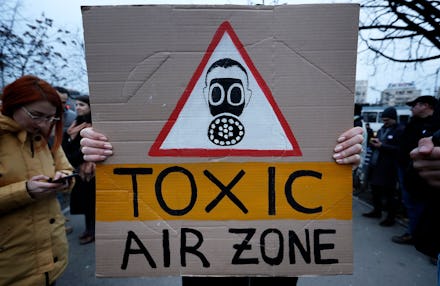Fossil fuel air pollution now kills more people than cigarettes do

For decades, governments and health professionals rightly focused efforts on getting people to quit smoking by showing the damage that carcinogens in cigarettes could do to the body. That effort largely worked, resulting in a decline in smoking and similarly a decline in health conditions caused by the activity. But now there's something worse than smoking that is damaging our bodies: air pollution caused by burning fossil fuels. According to a new study published this week in the journal Cardiovascular Research, researchers found that health issues caused by air pollution now kill about 8.8 million people per year — more than the 7.2 million people who die from smoking.
Diminishing air quality has become something of a silent killer that fails to capture the imagination of people despite being responsible for increasingly poor health outcomes, including death, for millions of people around the world. With air pollution on the rise more people are experiencing conditions like lung cancer, heart disease, and respiratory infections. If any other culprit was resulting in such a high rate of death, it would garner massive attention and be the impetus for an international response. For that reason, the authors of the study believe that air pollution should be considered a pandemic.
Unlike addressing the smoking epidemic, though, tackling the issue of air pollution is a little trickier. Addressing air quality is a little trickier when there is only so much that individuals can do — it's not just a matter of convincing people to give up cigarettes. The researchers ran a series of models to determine where air pollution was the worst and what was causing the decline in air quality and their findings suggested the primary culprit is fossil fuels. Much like how just a handful of companies are responsible for the pollution that has resulted in ocean acidification, the majority of air pollution is caused by just small number of companies — energy firms that run dirty-burning power plants, car manufacturers that produce gas-guzzling vehicles, and massive corporations that operate factories and warehouses that demand tons of energy consumption. Individuals certainly play a role in relying on inefficient vehicles and requiring a certain amount of energy to power their homes, but the alternatives aren't always obvious. Many people can't choose to change to a cleaner power grid, for instance — and many clean energy options — like electric vehicles or renewable energy systems — are still not particularly affordable at a consumer level. Even if those options were readily available, truly addressing air pollution would require corporations to change their ways.
Until they do, negative health outcomes will continue. It's not just a matter of harming the physical body, either. Last year, researchers found ties between air quality and mental health. The study found that worsening air quality tends to negatively affect populations experiencing depression and other mental illness — particularly in young people, who see a quadrupled risk of depression when exposed to poor air quality. Living in a place with an elevated rate of air pollution was found to lead to as much as a 10 percent increase in the likelihood of experiencing depression, and also was tied to higher rates of suicide among those dealing with mental illness.
This is bad news for people globally, but it's proven particularly problematic in the United States, where air quality has been on the decline since the start of the Trump administration. Increased rates of forest fires as well as the continued burning of fossil fuels — enabled by Trump, who has loosened environmental protections to allow corporations to pollute more — has led to the country's first downturn in air quality in over a decade. The people hurt most by this increase in air pollution are the country's most vulnerable populations. A study published last year found that low-income counties, particularly those with a predominately black population, were often the ones most affected by declining air quality. And even if these communities were to push companies to clean up their act, they may not be entirely safe. Research published earlier this year found that air pollution from neighboring states often drifts into communities, exposing them to pollution that they have no hand in creating and have no real power to stop or regulate. In both cases of local and drifting pollution, the decline in air quality was found to be tied to premature deaths.
Air pollution is an international problem — particularly when it comes to the toxic junk pushed into the atmosphere by burning fossil fuels. Cutting down on our reliance on these dirty-burning fuel sources wouldn't just have the short-term effect of clearing the air and improving health outcomes for millions of people, it is also essential to the long-term viability of the planet as we fight to limit the effects of climate change. It might be time to start treating fossil fuel burning companies the same way that we treated tobacco companies during the peak of the smoking epidemic. They are the ones metaphorically lighting the cigarettes, but it's our bodies and planet that is getting hurt.